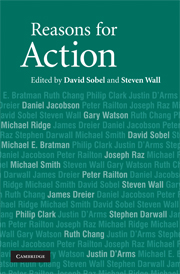Book contents
- Frontmatter
- Contents
- Notes on the contributors
- Acknowledgments
- 1 Introduction
- 2 Intention, belief, and instrumental rationality
- 3 Reasons: practical and adaptive
- 4 The explanatory role of being rational
- 5 Practical competence and fluent agency
- 6 Practical conditionals
- 7 Authority and second-personal reasons for acting
- 8 Promises, reasons, and normative powers
- 9 Regret and irrational action
- 10 Mackie's motivational argument
- 11 The truth in Ecumenical Expressivism
- 12 Voluntarist reasons and the sources of normativity
- Bibliography
- Index
11 - The truth in Ecumenical Expressivism
Published online by Cambridge University Press: 05 May 2010
- Frontmatter
- Contents
- Notes on the contributors
- Acknowledgments
- 1 Introduction
- 2 Intention, belief, and instrumental rationality
- 3 Reasons: practical and adaptive
- 4 The explanatory role of being rational
- 5 Practical competence and fluent agency
- 6 Practical conditionals
- 7 Authority and second-personal reasons for acting
- 8 Promises, reasons, and normative powers
- 9 Regret and irrational action
- 10 Mackie's motivational argument
- 11 The truth in Ecumenical Expressivism
- 12 Voluntarist reasons and the sources of normativity
- Bibliography
- Index
Summary
Early expressivists, such as A.J. Ayer, argued that normative sentences are not truth-apt, and many found this striking claim implausible. After all, ordinary speakers are perfectly happy to ascribe truth and falsity to normative assertions. It is hard to believe that competent speakers could be so wrong about the meanings of their own language, particularly as these meanings are fixed by the conventions implicit in their own linguistic behavior. Later expressivists therefore tried to arrange a marriage between expressivism and the truth-aptness of normative discourse. Like many arranged marriages, this has not been an entirely happy one. In particular, the marriage has seemed to depend on so-called deflationist theories of truth, and these may well turn out to provide at best a shaky foundation for any marriage. Before advising the parties to file for divorce, though, we should first see whether expressivism itself has not been misunderstood. I argue that the marriage of expressivism to the truth-aptness of normative discourse can indeed be saved, though only in the context of a version of expressivism I call “Ecumenical Expressivism.”
I EXPRESSIVISM AND DEFLATIONIST TRUTH: HOSTAGES TO FORTUNE
A guiding idea behind expressivism is that the meaning of normative predicates should be understood in terms of the way in which they are conventionally used to express pro-attitudes. This idea finds its most natural home in a broadly Lockean philosophy of language.
- Type
- Chapter
- Information
- Reasons for Action , pp. 219 - 242Publisher: Cambridge University PressPrint publication year: 2009
- 11
- Cited by



